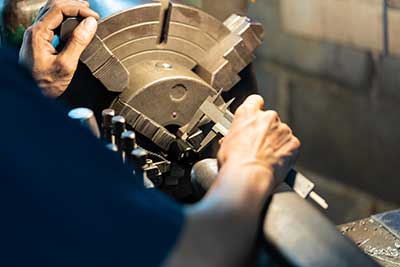Need to Hire CNC Machine Operators?
RSS is Your Trusted Source for CNC Machine Operators
Leveraging over 30 years of staffing expertise, we have a deep understanding of the specific challenges and requirements associated with operating CNC machines both efficiently and safely. Our aim is to supply your business with skilled, experienced, and reliable CNC machine operators who can smoothly integrate into your operations and contribute to your success.

Regional Supplemental ServicesOn-Demand Reliable Workforce

CNC Machine Operator Staffing
For those moments when you need to bridge a temporary gap, adjust for seasonal demand fluctuations, or tackle a short-lived project, RSS stands ready to support you. Our adaptable staffing solutions are crafted to precisely cater to your needs, ensuring your CNC machine operations proceed without any hitches.
Rapid Response Staffing: Understanding that CNC machine operations must remain uninterrupted, we provide swift staffing solutions for urgent needs, ensuring your operations stay on track and comply with all safety protocols.
Custom Staffing Strategies: Recognizing the uniqueness of every enterprise and its staffing challenges, at RSS, we engage with you to grasp your exact requirements. With this insight, we formulate a staffing strategy that not only matches your operational ambitions but also respects your financial considerations.
Qualified and Reliable CNC Machinists


Positions We Fill
Machinst
CNC Machine Operator
CNC Programmer
CNC Plasma Cutter Operator
CNC Lathe Machinist
CNC Mill Operator
CNC Router Operator
CNC Plasma Programmer
Discover The RSS Difference
Flexibility & Dependability: Our flexible staffing solutions are tailored to adapt to the evolving needs of your CNC machine operations, offering the dependability and assurance that capable hands manage your processes.
Economic Strategies: Choosing RSS for your temporary staffing needs eliminates the expenses and complexities of hiring and training new staff. Our strategies are designed to be economical, enabling you to optimize your resource distribution.
Prioritizing Safety: Ensuring the safety of your workplace is our utmost concern. We guarantee that every CNC machine operator we provide meets the highest safety standards, reducing risks and fostering a secure environment for all.
Contact Us
Don’t let staffing challenges hinder your CNC machine operations. Reach out to RSS today to explore how our expert temporary staffing solutions can support you in achieving seamless, efficient, and secure operations.
Client Testimonials
Frequently Asked Questions
What industries do CNC Machinists work in?
CNC machinists are vital across a broad spectrum of industries, contributing their expertise to create precise components essential for various applications. Here’s a look at some of the key industries where CNC machinists find employment:
- Aerospace: In the aerospace industry, CNC machinists manufacture parts for airplanes, helicopters, and spacecraft. These components must meet extremely high standards of precision and durability, given the critical safety requirements of air and space travel.
- Automotive: The automotive sector relies on CNC machinists to produce engine components, transmission parts, and other precision items essential for vehicle performance and safety. This industry values the ability to produce high-quality parts at a high volume.
- Medical Devices: CNC machinists play a crucial role in the medical device industry by producing surgical instruments, implants (such as joint replacements), and equipment used in diagnostics and treatment. These products require utmost precision for patient safety and efficacy.
- Defense: In the defense industry, machinists manufacture components for military vehicles, weaponry, and surveillance equipment. Like aerospace, this sector demands parts that meet rigorous standards for performance and reliability.
- Electronics: The electronics industry employs CNC machinists to create precision components for consumer electronics, communication devices, and semiconductors. These parts often require intricate designs and high precision.
- Energy: Within the energy sector, including oil and gas, nuclear, and renewable energy sources, CNC machinists fabricate components used in power generation and distribution systems, as well as drilling and exploration equipment.
- Industrial Machinery: This broad category includes manufacturing equipment, agricultural machinery, and construction machinery. CNC machinists produce parts that ensure the reliability and efficiency of machines used across various industries.
- Consumer Products: Beyond these industrial applications, CNC machinists also contribute to the production of a wide range of consumer goods, including sports equipment, musical instruments, and even custom furniture pieces.
What is CNC Machining?
CNC machining is a manufacturing process known for its precision and automation capabilities. CNC stands for Computer Numerical Control, which means that machines are controlled by computer programming rather than manually operated. This process involves using computers to manage and control the movement and operation of machine tools, such as mills, lathes, grinders, and routers, to shape and fabricate metal and plastic parts.
The CNC machining process begins with creating a 2D vector or 3D solid part CAD (Computer-Aided Design) model. This model is then converted into a CNC program, also known as G-code, which provides the instructions for the CNC machine to produce the part. The G-code dictates everything from the movement of the tools to the speed at which they operate and the feed rate of the material.
Key aspects of CNC machining include:
- High Precision and Accuracy: CNC machines can produce parts with tight tolerances and consistent quality, making them ideal for applications requiring a high degree of precision.
- Automation: Once the machine is set up and the program is loaded, CNC machines can operate with minimal human intervention, allowing for continuous production with less risk of error.
- Flexibility: CNC programming can be easily modified to produce different parts, making CNC machines adaptable to various manufacturing needs.
- Efficiency: CNC machines can rapidly produce parts with complex shapes that would be difficult, time-consuming, or even impossible to make manually.
- Reduced Labor Costs: Automation reduces the need for manual labor in the manufacturing process, although skilled technicians are still required to program and maintain the machines.
Is there a difference between a CNC machine operator and a CNC machinist?
For Employers Looking for Staffing Solutions?
Employers please submit the form below regarding your need for staffing solutions.
